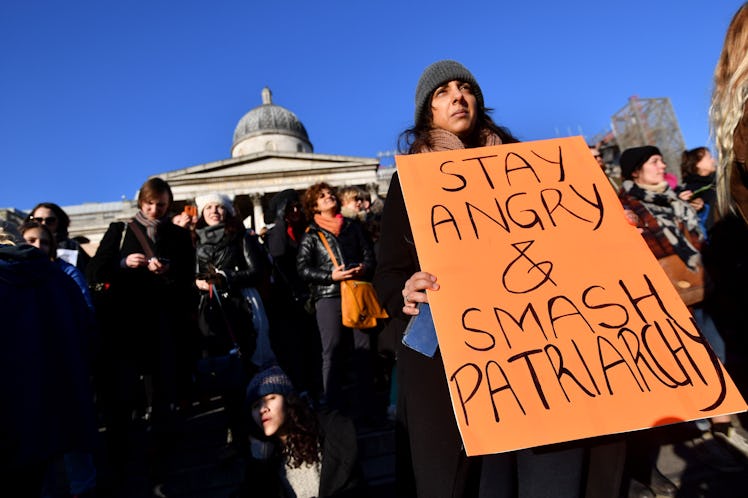
Viral "Me Too" Hashtag Is Showing How Widespread Sexual Assault Really Is
The growing allegations of sexual misconduct in Hollywood seem to be never-ending, and it can make survivors feel powerless to watch them emerge. Now, a conversation about how harassment and assault impact women everywhere is hopefully changing that. On Sunday, Oct. 15, survivors told their stories on social media platforms through tweets with the “Me Too” hashtag. The sheer number of tweets — and heartbreaking stories — show just how much of a problem sexual harassment is across the country.
The topic is on everyone's minds after some two dozen women, including Gwyneth Paltrow, Ashley Judd, and Angelina Jolie, have come forward with allegations of sexual impropriety against influential producer Harvey Weinstein. The movie mogul denied the allegations in a statement from his spokeswoman Sallie Hofmeister:
Any allegations of non-consensual sex are unequivocally denied by Mr. Weinstein. Mr. Weinstein has further confirmed that there were never any acts of retaliation against any women for refusing his advances. Mr. Weinstein obviously can’t speak to anonymous allegations, but with respect to any women who have made allegations on the record, Mr. Weinstein believes that all of these relationships were consensual. Mr. Weinstein has begun counseling, has listened to the community and is pursuing a better path. Mr. Weinstein is hoping that, if he makes enough progress, he will be given a second chance.
Actress Alyssa Milano helped kick off the trending topic when she asked followers to respond to her tweet with a "me too" if they'd been sexually harassed or assaulted. Milano included a screenshot that said "Suggested by a friend: If all the women who have been sexually harassed or assaulted wrote 'Me too.' as a status, we might give people a sense of the magnitude of the problem," with her own response. "Me too." (Milano has not accused Weinstein of sexual misconduct.)
Thousands of people then chimed in with stories of assault and harassment. Some even said they weren't comfortable posting the specifics of their stories, but felt compelled to post "#MeToo."
While these tweets recount the experiences of those who've been harassed or assaulted at work and beyond, there's data to back up these numbers.
According to a 2016 study by the Equal Employment Opportunity Commission, between 25 percent and 85 percent of women reported being sexually harassed in the workplace, depending on how the survey was conducted. Still, even the lower end of the findings accounts for one in four women.
According to the anti-sexual violence organization Rape, Abuse, & Incest National Network (RAINN), overall one in six American women has been the victim of an attempted or completed rape in her lifetime. That accounts for millions of women across the country — and so many whose stories have received national attention or who've had recourse against the perpetrators.
In the wake of the allegations against Weinstein, men have also come out with their stories of sexual harassment and assault. According to RAINN, three percent of men will experience an attempted or completed rape in their lifetime.
For transgender and gender nonconforming people, the numbers are staggering. According to RAINN, 21 percent of trans and gender nonconforming college students have been sexually assaulted.
Given how pervasive sexual harassment and assault are, many tweets noted how survivors were afraid of reporting because they were afraid they wouldn't be believed, or that they didn't want to report the assault because it meant they would have to recount — and relive — what happened to them.
In addition to the harrowing stories of assault, some also called for men to take note of the hashtag and commit to fighting rape culture on their own. By the evening, Milano's tweet had been retweeted more than 5,000 times and received more than 17,000 responses.
The allegations against Weinstein aren't the first time the Internet has tackled rape culture. In 2016, many were outraged over the shockingly short sentence that Brock Turner, a former Stanford University student, received for sexually assaulting an unconscious woman. More recently, sexual harassment allegations against Fox News power players Roger Ailes and Bill O'Reilly, as well as Bill Cosby's mistrial for allegedly drugging and assaulting a woman, have inspired conversations about the pervasiveness of sexual assault and harassment.
While it takes bravery to come forward no matter how famous you are, it takes a special kind of courage to come forward if you don't have even the power of an influential name. Kudos to everyone who took the deep breath and told their story.